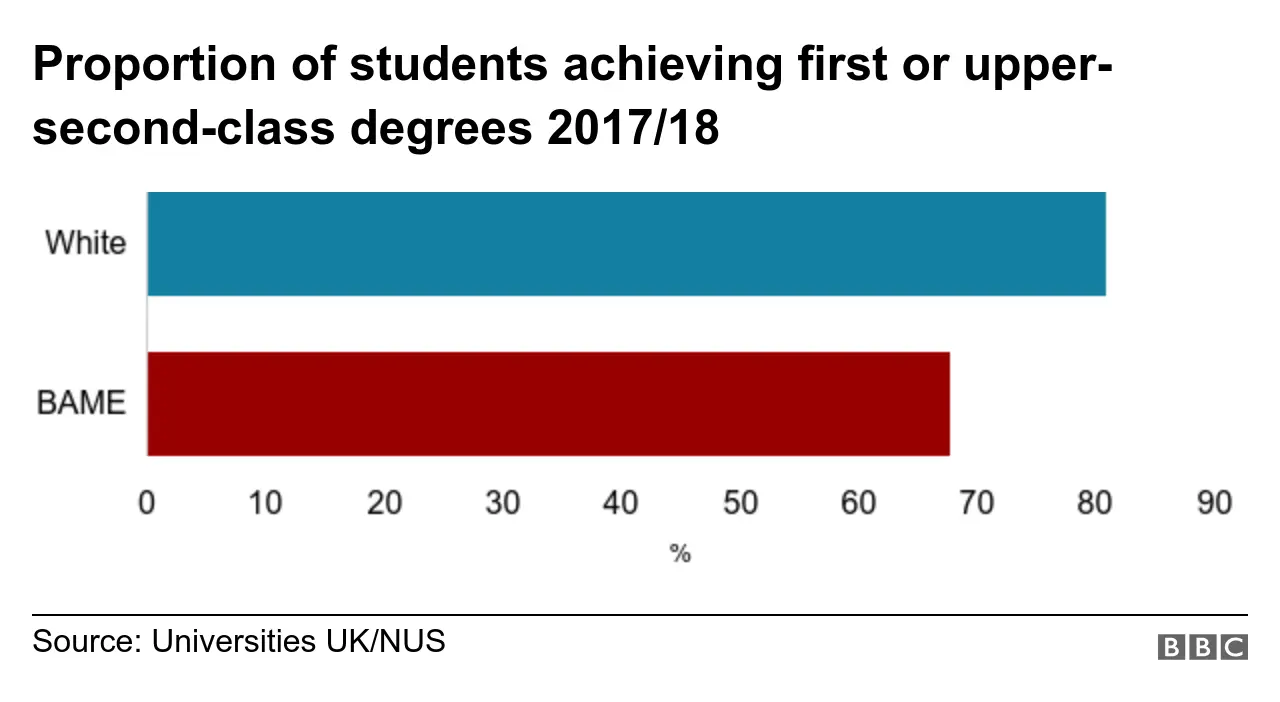Universities told to tackle race attainment gap
 BBC
BBCUniversities must "accelerate efforts" to close a gap in degree attainment between white and black, Asian and minority ethnic students, a study says.
Universities UK and the National Union of Students highlight a 13% gap between the chances of white and BAME students getting a first or upper second degree.
UUK and the NUS say campuses need a culture change to feel more inclusive.
"To make sure our gap closes, there need to be initiatives," says Aston University student Amna Atteeq.
"And we are more than happy to get involved," says Amna, who contributed to the UUK and NUS research.
"But we need to know where we need to start and what we need to look for. We want university support looking at the curriculum, at other staff members at the university or at having other talks from people who have succeeded in careers and bringing them back to inspire our students."
Joel Simpson, from the University of the Arts in London, who also contributed to the research, added: "I think it's definitely key that the staff interrogate the data behind attainment gaps.
"But they need to understand the nuances, the factors that lead to those attainment gaps. That can only really be gained by immersing themselves within the student body, getting a clear understanding of students' day-to-day lives and how students move through the college.
"Sometimes it can be the smallest things that affect a student's mindset."

For Amna, who is coming towards the end of her term as Student Union president at Aston, giving BAME students good role models is crucial to raising aspirations.
"I think there's this unconscious bias with students that, if they don't see their role models in certain careers at university or in certain careers, in companies, they automatically take them out of line of their future career.
"And for us to tackle that, it's really important to have certain role models at university, or bring people on board through talks, to show our students that they have made it in certain companies or career paths."
What does the report recommend?
The report acknowledges that many universities have worked to reduce the attainment gap, but says that with 81% of white students getting a first or 2:1 in 2017-18 compared with 68% of BAME students, more must be done.
It highlights five ways that universities can improve outcomes:
- provide strong leadership - university leaders should demonstrate a commitment to removing the BAME attainment gap and lead by example
- have conversations about race and changing cultures
- develop racially diverse and inclusive environments, ensuring that BAME students have a good sense of belonging
- gather and analyse data on the attainment gap
- understand what works - universities can share evidence of what works and what does not
UUK is asking vice-chancellors to sign up to an online pledge to work with students.
Meanwhile, the Office for Students (OfS) has set a target for the higher education sector to eliminate the unexplained gap in degree outcomes by 2024-25.
What do the report authors say?
Baroness Amos, director of SOAS, who co-led the report, said: "Our universities are racially and culturally diverse, compared to many other sectors, but we are failing a generation of students if we don't act now to reduce the BAME attainment gap.

"It is important that universities act and are transparent in their approach so black, Asian and minority ethnic students are given the best chance of success."
Amatey Doku, NUS vice-president for higher education, said that universities had presided over significant gaps in attainment between BAME students and white students "for far too long".
"From decolonising the curriculum to more culturally competent support services, many students and students' unions have been fighting and campaigning for action in this area for years.
"This report highlights good practice and clear practical steps for universities to take to begin to respond to many of the concerns raised."
What does the regulator say?
Chris Millward, director for fair access and participation at the OfS, said the report was "welcome and timely".
"The OfS has set a target for the higher education sector to eliminate the unexplained gap in degree outcomes between white and black students by 2024-25.
"In order to do this, universities must take urgent action to understand what is causing these differences, and reduce the gaps so that all students - whatever their background - are given every opportunity to reap the rewards that higher education can bring."
